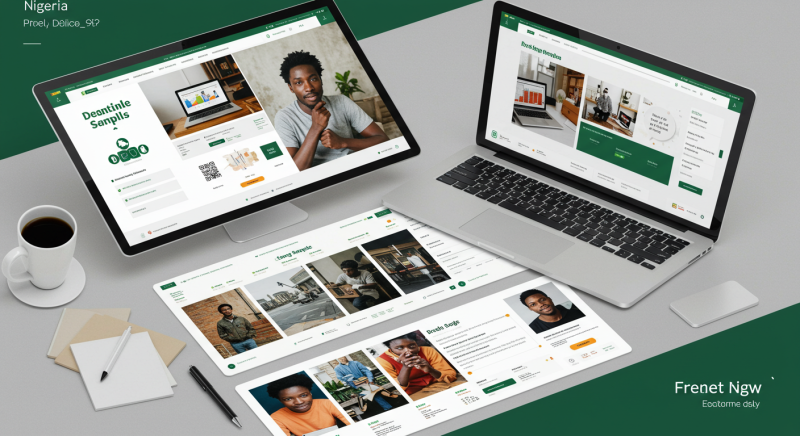Picture this: Lagos traffic at 6 AM, the honking horns, the frustration of another day stuck in a cubicle for eight hours, and the sinking feeling that your talents are worth more than your monthly salary. This is the reality for millions of Nigerians—but it doesn’t have to be yours.
The world of freelancing in Nigeria has exploded in recent years, creating a pathway to financial independence for talented professionals across the country. According to a 2024 report by the Nigerian Bureau of Statistics, the gig economy in Nigeria has grown by an impressive 77% since 2020, with over 2.3 million Nigerians now identifying as freelancers.
This surge in freelancing in Nigeria isn’t happening in isolation. It’s part of a global shift in work culture accelerated by technological advancements and changing attitudes toward traditional employment. For Nigerians specifically, freelancing represents not just flexibility and better income potential, but also a path to international opportunities without the need for relocation.
This comprehensive guide explores everything you need to know about freelancing in Nigeria: how to find and secure freelance opportunities, from identifying your marketable skills to navigating payment systems and building a sustainable freelance career right here in Nigeria.
Key Takeaways:
- The Nigerian freelance market is growing rapidly, with over 77% increase in freelancers since 2020
- Developing specialized skills and building a strong online portfolio are crucial for success
- Local and international platforms offer diverse freelancing in Nigeria opportunities
- Networking, both online and offline, significantly increases chances of securing projects
- Understanding payment methods and legal considerations protects Nigerian freelancers

Understanding the Nigerian Freelance Landscape
Before diving into how to secure opportunities, it’s essential to understand what makes freelancing in Nigeria unique compared to other markets.
Nigeria’s freelance ecosystem is characterized by a fascinating blend of local and international opportunities. While platforms like Fiverr and Upwork remain popular among Nigerian freelancers seeking international clients, local platforms such as Jooble Nigeria and NgCareers have emerged to connect freelancers with Nigerian businesses.
According to research by Payoneer’s Global Gig Economy Index, Nigeria ranks among the top ten countries with the fastest-growing freelance markets globally. This growth is particularly evident in sectors like content creation, web development, digital marketing, and virtual assistance—areas where Nigerian talent is increasingly recognized worldwide.
The COVID-19 pandemic served as a significant catalyst for freelancing in Nigeria, pushing many businesses to embrace remote work models and driving professionals to seek alternative income sources. A survey by Flexjobs found that 65% of Nigerian freelancers started their freelance journey during or after the pandemic.
Identifying Your Freelance Niche in Nigeria
Success in freelancing in Nigeria: how to find and secure freelance opportunities begins with identifying where your skills align with market demands. The most lucrative freelance sectors in Nigeria currently include:
- Tech and Programming: With Nigeria’s reputation as Africa’s tech hub, developers and IT specialists can command premium rates both locally and internationally. According to HackerRank, Nigerian developers rank among the top 20 globally in programming skills.
- Content Creation and Digital Marketing: From copywriting to social media management, content creators are in high demand as Nigerian businesses increase their digital presence. Content marketing roles have seen a 94% increase in demand since 2022.
- Graphics Design and Multimedia: Visual content creators with skills in design, animation, and video editing are finding abundant opportunities as brands emphasize visual storytelling.
- Virtual Assistance: Administrative support roles have grown substantially, with many international companies seeking Nigerian VAs for their excellent communication skills and favorable time zone differences with Western clients.
- Financial Services: Accounting, bookkeeping, and financial analysis are growing niches, especially with the expansion of Nigerian fintech companies.
To identify your optimal niche within the freelancing in Nigeria ecosystem, assess your existing skills, market demand, competition level, and earning potential. The sweet spot lies at the intersection of what you’re good at, what you enjoy, and what clients are willing to pay for.
Building Your Skills for Freelancing Success in Nigeria
Once you’ve identified promising niches for freelancing in Nigeria: how to find and secure freelance opportunities, the next step is developing or refining relevant skills.
Nigeria’s competitive freelance market demands excellence. According to a survey by Workana, clients hiring Nigerian freelancers rank skill proficiency as their top criterion, above price and experience.
Here are practical ways to develop marketable skills for freelancing in Nigeria:
- Online Courses and Certifications: Platforms like Coursera, Udemy, and Google Digital Skills for Africa offer specialized courses—many with financial aid options for Nigerians. Tech skills particularly benefit from certifications that validate your expertise.
- Local Workshops and Bootcamps: Organizations like Co-Creation Hub (CcHUB) in Lagos regularly host workshops for digital skills. These provide both learning opportunities and networking with potential clients.
- Apprenticeships and Mentorships: Finding experienced freelancers to learn from can fast-track your growth. Many successful Nigerian freelancers now offer mentorship programs specifically for beginners.
- Practice Projects: Building a portfolio through personal projects demonstrates your capabilities even before landing clients. For writers, this might mean starting a blog; for developers, creating open-source projects.
- Language Proficiency: While English is already widely spoken in Nigeria, refining business communication skills significantly improves client relationships, especially with international clients.
A strategic approach to skill development for freelancing in Nigeria involves both depth (becoming exceptional in your core skill) and breadth (developing complementary skills). For instance, a web developer who understands basic design principles and SEO fundamentals can offer more comprehensive services.
Creating a Standout Portfolio for Freelancing in Nigeria
Your portfolio serves as your primary marketing tool when seeking opportunities in freelancing in Nigeria: how to find and secure freelance opportunities. It’s your chance to make a strong first impression when clients can’t meet you face-to-face.
For Nigerian freelancers, portfolios need to overcome certain preconceptions that some international clients might have. Creating a portfolio that demonstrates professionalism, reliability, and quality work is essential.
Key elements of an effective portfolio for freelancing in Nigeria include:
- Professional Website: A dedicated portfolio site gives clients confidence in your professionalism. Platforms like WordPress, Wix, or Squarespace make this accessible even without coding knowledge. Include your domain name in all communications for brand consistency.
- Case Studies: Rather than simply showing finished work, explain your process, the challenges faced, and how you overcame them. This demonstrates your problem-solving abilities and work ethic—qualities highly valued in freelancers.
- Client Testimonials: Feedback from previous clients builds trust. Even testimonials from pro bono or practice projects can be valuable when starting out in freelancing in Nigeria.
- Specialized Samples: Tailor your portfolio to showcase work relevant to your target clients. For instance, if targeting fintech companies, highlight projects related to financial services.
- Regular Updates: The freelance marketplace evolves quickly. Update your portfolio quarterly to include your latest work and evolving skills.
Remember that different professions require different portfolio approaches. Writers might use platforms like Contently or Medium, designers could leverage Behance or Dribbble, while developers might showcase code repositories on GitHub alongside their personal sites.
Finding Freelance Opportunities in Nigeria
Now comes the practical aspect of freelancing in Nigeria: how to find and secure freelance opportunities—where exactly to find clients willing to pay for your services.
The opportunities for freelancing in Nigeria exist across multiple channels, and successful freelancers typically utilize several simultaneously:
- International Freelance Platforms: Upwork, Fiverr, Freelancer.com, and PeoplePerHour connect Nigerian freelancers with global clients. According to Payoneer’s data, Nigerian freelancers on these platforms earn an average of $23 per hour, though rates vary widely by specialization.
- Nigeria-Specific Platforms: Local job boards like Jooble Nigeria, NgCareers, and Joberman frequently list freelance opportunities with Nigerian companies. These often have less competition than international platforms.
- LinkedIn Optimization: A professional LinkedIn profile optimized with keywords related to freelancing in Nigeria and your specific skills can attract both active and passive opportunities. Use LinkedIn’s “Open to Work” feature specifically for freelance roles.
- Industry-Specific Marketplaces: Depending on your niche, specialized platforms may offer better opportunities. For example, writers might use Contently or ProBlogger, designers can explore 99designs, and developers might find projects on Toptal or Stack Overflow Jobs.
- Direct Outreach: Research companies that might benefit from your services and reach out directly with customized pitches. Nigerian businesses are increasingly open to freelance arrangements for specialized tasks.
- Referral Networks: According to a survey by the Nigerian Freelancers Union, over 60% of established freelancers in Nigeria find at least half their clients through referrals. Nurturing relationships with clients and other freelancers builds this network over time.
A strategic approach to finding opportunities in freelancing in Nigeria involves diversifying your sources while monitoring which channels provide the highest quality leads for your specific niche.
Effective Bidding and Proposal Strategies for Nigerian Freelancers
Once you’ve identified potential opportunities for freelancing in Nigeria: how to find and secure freelance opportunities, crafting compelling proposals becomes your next challenge.
Nigerian freelancers face unique considerations when bidding on projects. International clients may have preconceptions about Nigerian service providers, while local businesses might have different expectations regarding rates and deliverables.
Here’s how to create proposals that convert for freelancing in Nigeria:
- Research Before Bidding: Understand the client’s business, industry challenges, and specific needs before writing your proposal. This demonstrates genuine interest and helps customize your approach.
- Address the “Nigeria Question”: For international clients who might have concerns about working with Nigerian freelancers, proactively address potential concerns about communication, payment methods, and time zone differences.
- Value-Based Pricing: Rather than competing on price alone (a losing strategy in the long run), articulate the specific value you bring. For instance, a web developer might highlight how their solution will increase conversion rates.
- Social Proof Integration: Incorporate testimonials or performance metrics from previous projects directly into your proposals. This builds credibility quickly.
- Clear Project Roadmap: Outline your process, timeline, and deliverables specifically for the project at hand. This demonstrates professionalism and helps clients visualize working with you.
- Follow-Up Protocol: Develop a system for following up on submitted proposals without being intrusive. A single, thoughtful follow-up message 3-5 days after submission often increases response rates.
Particularly for Nigerian freelancers competing globally, proposal quality can overcome initial hesitations clients might have. Focus on clarity, professionalism, and specific solutions rather than generic capabilities.
Building Client Relationships Through Effective Communication
Success in freelancing in Nigeria: how to find and secure freelance opportunities extends beyond winning the initial project—it involves nurturing client relationships for repeat business and referrals.
Communication challenges can be particularly relevant for Nigerian freelancers working with international clients across different time zones and cultural contexts.
Effective communication strategies for freelancing in Nigeria include:
- Clear Communication Channels: Establish preferred communication methods early and stick to them. Whether it’s email, Slack, WhatsApp, or another platform, consistency prevents misunderstandings.
- Proactive Updates: Don’t wait for clients to ask for progress reports. Regular updates demonstrate professionalism and prevent clients from worrying, especially when working across significant time differences.
- Cultural Awareness: Understanding communication norms in your client’s culture helps prevent misunderstandings. For example, communication styles vary significantly between Nigerian businesses and those in Europe or North America.
- Documentation Habits: Confirm key decisions and project details in writing, even after verbal discussions. This protects both parties and creates a reference point for deliverables.
- Value-Add Communications: Occasionally sharing relevant industry insights or suggestions beyond the scope of your current project positions you as a strategic partner rather than just a service provider.
Effective communication is particularly crucial when issues arise. Nigerian freelancers who address problems transparently and propose solutions maintain client trust even during challenging projects.
Managing Finances and Payments in Nigerian Freelancing
One of the most challenging aspects of freelancing in Nigeria: how to find and secure freelance opportunities involves getting paid reliably and managing finances efficiently.
Nigerian freelancers face unique payment challenges, including limited payment platform options and currency exchange considerations. According to research by FreeUp, payment issues are cited as the top challenge by 73% of Nigerian freelancers.
Essential financial management strategies for freelancing in Nigeria include:
- Diversified Payment Options: Offering multiple payment methods increases client convenience. Popular options for Nigerian freelancers include PayPal (through verified workarounds), Payoneer, Wise (formerly TransferWise), and cryptocurrency for international clients, plus bank transfers and mobile money for local clients.
- Clear Payment Terms: Detailed contracts specifying payment amounts, schedules, currencies, and late payment penalties protect your interests. For larger projects, milestone-based payments reduce risk.
- Invoicing Systems: Professional invoicing using tools like Wave, Zoho Invoice, or even customized templates reinforces your business credibility and helps track outstanding payments.
- Tax Compliance: While Nigeria’s tax framework for freelancers remains developing, maintaining records of income and business expenses prepares you for compliance and potential deductions.
- Currency Management: With fluctuating exchange rates affecting Nigerian freelancers, strategies like partial payments in foreign currency and partial conversions can minimize losses.
- Emergency Fund Development: The irregular income typical of freelancing in Nigeria necessitates building a financial buffer—experts recommend saving at least three months of expenses.
Financial management extends beyond client payments to overall business health. Tracking income sources helps identify your most profitable clients and services, informing future business decisions.
Legal Considerations for Nigerian Freelancers
Navigating the legal aspects of freelancing in Nigeria: how to find and secure freelance opportunities provides protection for both you and your clients.
The legal framework for freelancers in Nigeria continues to evolve, with increasing recognition of the gig economy but still some gray areas in legislation. According to the Nigerian Freelancers Association, over 45% of Nigerian freelancers operate without formal business registration or contracts.
Key legal considerations for freelancing in Nigeria include:
- Business Registration Options: Registering as a business entity with the Corporate Affairs Commission provides legitimacy, though many Nigerian freelancers begin as unregistered sole proprietors. Consider registration once your freelance income becomes substantial.
- Contract Essentials: Even simple contracts should cover scope of work, deliverables, payment terms, intellectual property rights, confidentiality requirements, and dispute resolution procedures. These protect both parties and clarify expectations.
- Intellectual Property Protection: Understanding when you retain rights to your work and when those rights transfer to clients prevents future disputes. Work-for-hire and license arrangements should be explicitly defined.
- Data Protection Compliance: When handling client data, compliance with relevant regulations like Nigeria’s Data Protection Regulation (NDPR) and international standards like GDPR (for European clients) prevents potential liabilities.
- Insurance Considerations: Professional liability insurance, though not yet common among Nigerian freelancers, provides protection against claims of negligence or failure to deliver promised services.
The legal landscape for freelancing in Nigeria will likely continue developing as the sector grows. Staying informed about relevant regulations through professional networks and legal resources specific to Nigerian freelancers ensures ongoing compliance.

Scaling Your Freelance Business in Nigeria
Once you’ve established yourself in freelancing in Nigeria: how to find and secure freelance opportunities, the question becomes how to grow beyond trading time for money.
The ceiling for individual freelancers is typically determined by available hours. Scaling allows for increased income without proportional time increases. According to a study by Lagos Business School, only about 12% of Nigerian freelancers successfully transition to agency models or productized services.
Strategies for scaling your freelancing in Nigeria business include:
- Rate Increases: As you build expertise and a reputation, gradually increasing your rates allows income growth without additional time investment. Many successful Nigerian freelancers double their rates within two years by focusing on high-value skills.
- Specialization vs. Diversification: Strategic specialization in high-demand niches enables premium pricing, while calculated diversification into complementary services expands revenue streams.
- Building a Team: Subcontracting to other Nigerian freelancers allows taking on larger projects while maintaining quality control. This approach requires strong project management skills and clear communication protocols.
- Productized Services: Converting freelance services into standardized products with set deliverables and pricing simplifies sales and delivery. For example, a freelance graphic designer might offer logo design packages with tiered pricing and clear deliverables.
- Passive Income Development: Creating digital products, templates, or courses related to your expertise generates income without direct time investment after initial creation.
Scaling a freelance business in Nigeria often requires shifting mindset from “freelancer” to “business owner”—focusing on systems, delegation, and strategic growth rather than day-to-day execution of all tasks.
Navigating Challenges in the Nigerian Freelance Market
While freelancing in Nigeria: how to find and secure freelance opportunities offers tremendous potential, understanding and preparing for common challenges increases your chances of success.
Nigerian freelancers face several distinct challenges compared to their counterparts in other countries:
- Infrastructure Issues: Intermittent power supply and internet connectivity challenges can affect productivity and client deadlines. Successful Nigerian freelancers develop backup systems, including power banks, alternative internet sources, and even co-working space memberships.
- Payment Limitations: Restricted access to certain international payment platforms necessitates creative solutions and sometimes additional fees. Staying updated on emerging fintech solutions specifically designed for African markets helps mitigate these challenges.
- Market Perception: Some international clients hold preconceptions about Nigerian professionals, often based on the country’s unfortunate association with scams. Building a strong online presence and securing positive reviews helps overcome these perceptions.
- Exchange Rate Fluctuations: The volatility of the Naira affects income predictability for Nigerian freelancers working with international clients. Developing pricing strategies that account for potential fluctuations provides some protection.
- Isolation and Burnout: The independent nature of freelancing in Nigeria can lead to professional isolation. Joining freelancer communities, both online and in-person, provides support networks and continued learning opportunities.
Despite these challenges, the growing success of Nigerian freelancers on global platforms demonstrates that they can be overcome with preparation, professionalism, and persistence.
Conclusion: Your Path to Successful Freelancing in Nigeria
The landscape of freelancing in Nigeria: how to find and secure freelance opportunities continues evolving rapidly, offering unprecedented potential for skilled professionals willing to navigate its unique characteristics.
The journey of freelancing in Nigeria typically progresses through several stages: skill development, portfolio building, client acquisition, relationship management, and eventually business scaling. Each stage presents distinct challenges and opportunities.
As remote work becomes increasingly normalized globally, Nigerian freelancers are well-positioned to capitalize on both local and international opportunities. The combination of Nigeria’s large English-speaking population, growing tech adoption, and relative cost advantages creates a favorable environment for freelance success.
Whether you’re considering freelancing as a side hustle or full-time career path, the fundamentals remain consistent: deliver exceptional value, communicate professionally, manage your business operations effectively, and continuously develop your skills and network.
The most successful Nigerian freelancers approach their work not merely as service providers but as business owners and problem solvers. By adopting this mindset and implementing the strategies outlined in this guide, you can join the growing ranks of Nigerians building sustainable careers and businesses through freelancing.

Frequently Asked Questions About Freelancing in Nigeria
Q1: How much can I realistically earn through freelancing in Nigeria?
A: Earnings vary widely based on skill specialization, experience level, and client type. According to Payoneer’s data, Nigerian freelancers earn average hourly rates ranging from $15-45, with technical skills commanding higher rates. Many successful Nigerian freelancers earn substantially more than their traditionally employed counterparts, especially when working with international clients.
Q2: Do I need to register my freelance business in Nigeria?
A: While not legally required when starting, registering your business with the Corporate Affairs Commission becomes advisable as your income grows. Registration provides legitimacy when dealing with larger clients and may offer tax advantages. Most Nigerian freelancers begin as unregistered sole proprietors and formalize their businesses once established.
Q3: How do I handle tax obligations as a Nigerian freelancer?
A: Nigerian freelancers should maintain records of all income and business-related expenses. Filing annual tax returns with the Federal Inland Revenue Service is required regardless of business registration status. Consulting with a tax professional familiar with freelance operations in Nigeria is recommended for specific guidance.
Q4: Which payment platforms work best for Nigerian freelancers?
A: Payoneer remains the most widely used platform due to its reliability and relatively low fees. Other options include Wise (formerly TransferWise), cryptocurrency payments (particularly stable coins), and bank transfers for local clients. Many Nigerian freelancers maintain multiple payment options to accommodate different client preferences.
Q5: How can I overcome the “Nigeria stigma” when seeking international clients?
A: Building a strong online presence with a professional website, active LinkedIn profile, and portfolio on respected platforms helps establish credibility. Starting with smaller projects to build positive reviews, being transparent about your location while emphasizing your specific expertise, and demonstrating exceptional communication skills all help overcome potential hesitations from international clients.
READ MORE
